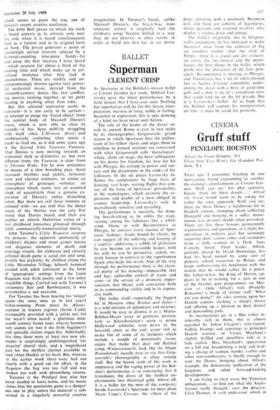BALLET
Superman
CLEMENT CRISP
As Spartacus in the Bolshoi's newest ballet at Covent Garden last week, Mikhail Lav-
rovsky gave the finest performance by a
male dancer that I have ever seen. Nothing but superlatives will do for this heroic inter- pretation; massive in force, noble in feeling, beautiful in expression, this is epic dancing of a kind we have never seen before.
The role of the leader of the slaves' re- volt in ancient Rome is cast in two styles by its choreographer, Grigorovich: grand scenes in which Spartacus fires the enthus- iasm of his fellow slaves and urges them to rebellion in danced orations are contrasted with what Grigorovich calls 'monologues' where, alone on stage, the hero soliloquises on his desire for freedom, his love for his wife Phrygia, his attitude to power and suc- cess and the dissensions in the ranks of his followers. In the set pieces Lavrovsky in-
flames his companions by huge feats of
dancing, vast leaps, soaring flights that con- vey all the force of Spartacus' personality;
in the monologues, which examine the as- pirations and doubts of a man obliged to assume leadership, Lavrovsky's style is marvellously sensitive and revealing.
The performance is masterly, the danc- ing breath-taking as he orbits the stage, roaring among his followers like a whirl- wind. Alone, or with Bessmertnova as Phrygia. he conveys every nuance of Spar- tacus' feelings: hands bound by chains, he can suggest all the suffering and longing of a captive; addressing a rabble of gladiators he can become an irresistible leader; with his wife he can be protective, ardent, en- tirely human in contrast to the superhuman figure who leads the revolt. And all the way through his performance there is the classi- cal purity of his dancing—impeccable feet and legs, admirable control of trunk and arms—at the service of a dramatic imper- sonation that blazes with conviction both in its commanding virility and in its expres- sive truth.
The ballet itself—reportedly the biggest hit in Moscow since Romeo and Juliet— is a wild mixture of splendours and miseries.
It would be easy to dismiss it as a Metro- Bolshoi-Mayer essay in giantism, particu- larly as Khatchaturian's score is prime Hollywood schmaltz, even down to the heavenly choir at the end; easier still to make fun of some of its incidents which include a couple of dementedly funny orgies that make that dear old Bolshoi
romp, Walpurgisnacht, look like the Magic Roundabout; equally easy to say that Grig-
orovich's choreography is often routine
stuff. But the heroic scale of the work is impressive and the raging power of the Bol-
shoi's performance is so convincing that it transmutes the dross of the feeblest en- chainments into theatrical gold. Above all, it is a ballet for the men of the company; beside Lavrovsky's Spartacus we must place Math Liepa's Crassus, the villain of the piece. glittering with a positively Neronian evil, and there are cohorts of legionaries, slaves, peasants and assorted revellers who display a tireless drive and energy.
The ballet's originality lies in Grigoro- vich's conception; he has managed to make theatrical sense from the contrast of big set numbers (rather after the style of Petipa: there is a grand pas des eselaves, an entree des bacchantes) and the mono- logues. the best things in the ballet, which probe into the characters of the four prin- cipals. Bessmertnova is moving as Phrygia, and Timofeyeva has a lot of old-fashioned fun as Aegina, Crassus' concubine, under- mining the slaves with a bevy of good-time girls and a slow w.utz to a saxophone tune that could land up on the hit parade. But it is Lavrovsky's ballet: let us hope that the Bolshoi will capture his interpretation on film--it must be saved for posterity.


































 Previous page
Previous page